Ethical AI: A Framework for Cryptocurrency Applications
The rise of artificial intelligence (AI) has transformed the way we live, work, and interact with technology. One area where AI is particularly relevant is in cryptocurrency applications, which have gained immense popularity in recent years. However, as cryptocurrencies continue to grow in value and usage, it’s essential to consider the ethical implications of using these technologies. In this article, we’ll explore a framework for implementing ethical AI in cryptocurrency applications.
What are Ethical AI?
Ethical AI refers to the use of artificial intelligence principles that prioritize human values, such as fairness, transparency, accountability, and respect for individual rights. These principles ensure that AI systems are designed to promote well-being, prevent harm, and respect human dignity. In the context of cryptocurrency applications, ethical AI is crucial for ensuring that these technologies are used responsibly and in ways that benefit society.
Key Principles for Ethical AI
When designing and implementing AI algorithms for cryptocurrency applications, it’s essential to consider the following key principles:
- Fairness: Ensure that AI decision-making processes are unbiased and fair, eliminating any discriminatory practices or biases.
- Transparency: Provide clear and understandable explanations of AI-driven decisions, enabling users to understand the reasoning behind them.
- Accountability: Establish mechanisms for holding developers and validators accountable for their actions, such as debugging tools and reporting systems.
- Respect for individual rights: Ensure that AI systems respect individual autonomy and privacy, preventing any potential harm or exploitation.
- Environmental responsibility: Consider the environmental impact of AI development and deployment, aiming to minimize energy consumption and reduce carbon footprint.
Cryptocurrency Specific Applications
To illustrate the application of these ethical principles in cryptocurrency applications, consider the following examples:
- Blockchain-based voting systems: Implementing a blockchain-based voting system that ensures transparency, fairness, and accountability can help prevent manipulation or tampering with votes.
- Smart contract development: Writing smart contracts that prioritize safety, security, and transparency can reduce the risk of cyber attacks or exploits in cryptocurrency transactions.
- Predictive analytics for market analysis: Using AI-powered predictive analytics to analyze market trends and provide insights can help investors make informed decisions while minimizing potential harm.
Tools and Techniques for Ethical AI in Cryptocurrency Applications
To implement these principles and applications, developers and validators can utilize various tools and techniques, including:
- Natural Language Processing (NLP): Using NLP to understand and interpret user input, enabling more transparent and fair decision-making.
- Machine Learning: Employing machine learning algorithms that prioritize transparency, accountability, and fairness in AI-driven processes.
- Consensus protocols: Designing consensus protocols that ensure security, stability, and trustworthiness in cryptocurrency networks.
Conclusion

The use of ethical AI principles is essential for developing responsible and beneficial cryptocurrency applications. By prioritizing fairness, transparency, accountability, respect for individual rights, and environmental responsibility, developers can create AI-powered solutions that promote well-being and prevent harm. As the cryptocurrency ecosystem continues to grow and evolve, it’s crucial to establish a framework for ethical AI that ensures these technologies are used in ways that benefit society.
Để lại một bình luận